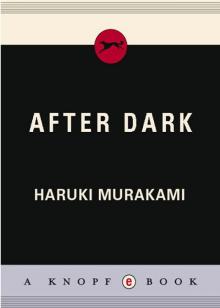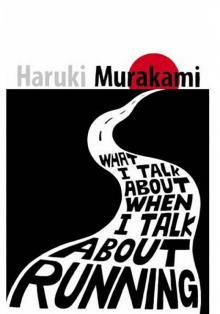- Home
- Haruki Murakami
The Elephant Vanishes Page 7
The Elephant Vanishes Read online
Page 7
We pass in front of a flower shop. A small, warm air mass touches my skin. The asphalt is damp, and I catch the scent of roses. I can’t bring myself to speak to her. She wears a white sweater, and in her right hand she holds a crisp white envelope lacking only a stamp. So: She’s written somebody a letter, maybe spent the whole night writing, to judge from the sleepy look in her eyes. The envelope could contain every secret she’s ever had.
I take a few more strides and turn: She’s lost in the crowd.
NOW, OF COURSE, I know exactly what I should have said to her. It would have been a long speech, though, far too long for me to have delivered it properly. The ideas I come up with are never very practical.
Oh, well. It would have started “Once upon a time” and ended “A sad story, don’t you think?”
ONCE UPON A TIME, there lived a boy and a girl. The boy was eighteen and the girl sixteen. He was not unusually handsome, and she was not especially beautiful. They were just an ordinary lonely boy and an ordinary lonely girl, like all the others. But they believed with their whole hearts that somewhere in the world there lived the 100% perfect boy and the 100% perfect girl for them. Yes, they believed in a miracle. And that miracle actually happened.
One day the two came upon each other on the corner of a street.
“This is amazing,” he said. “I’ve been looking for you all my life. You may not believe this, but you’re the 100% perfect girl for me.”
“And you,” she said to him, “are the 100% perfect boy for me, exactly as I’d pictured you in every detail. It’s like a dream.”
They sat on a park bench, held hands, and told each other their stories hour after hour. They were not lonely anymore. They had found and been found by their 100% perfect other. What a wonderful thing it is to find and be found by your 100% perfect other. It’s a miracle, a cosmic miracle.
As they sat and talked, however, a tiny, tiny sliver of doubt took root in their hearts: Was it really all right for one’s dreams to come true so easily?
And so, when there came a momentary lull in their conversation, the boy said to the girl, “Let’s test ourselves—just once. If we really are each other’s 100% perfect lovers, then sometime, somewhere, we will meet again without fail. And when that happens, and we know that we are the 100% perfect ones, we’ll marry then and there. What do you think?”
“Yes,” she said, “that is exactly what we should do.”
And so they parted, she to the east, and he to the west.
The test they had agreed upon, however, was utterly unnecessary. They should never have undertaken it, because they really and truly were each other’s 100% perfect lovers, and it was a miracle that they had ever met. But it was impossible for them to know this, young as they were. The cold, indifferent waves of fate proceeded to toss them unmercifully.
One winter, both the boy and the girl came down with the season’s terrible influenza, and after drifting for weeks between life and death they lost all memory of their earlier years. When they awoke, their heads were as empty as the young D. H. Lawrence’s piggy bank.
They were two bright, determined young people, however, and through their unremitting efforts they were able to acquire once again the knowledge and feeling that qualified them to return as full-fledged members of society. Heaven be praised, they became truly upstanding citizens who knew how to transfer from one subway line to another, who were fully capable of sending a special-delivery letter at the post office. Indeed, they even experienced love again, sometimes as much as 75% or even 85% love.
Time passed with shocking swiftness, and soon the boy was thirty-two, the girl thirty.
One beautiful April morning, in search of a cup of coffee to start the day, the boy was walking from west to east, while the girl, intending to send a special-delivery letter, was walking from east to west, both along the same narrow street in the Harajuku neighborhood of Tokyo. They passed each other in the very center of the street. The faintest gleam of their lost memories glimmered for the briefest moment in their hearts. Each felt a rumbling in the chest. And they knew:
She is the 100% perfect girl for me.
He is the 100% perfect boy for me.
But the glow of their memories was far too weak, and their thoughts no longer had the clarity of fourteen years earlier. Without a word, they passed each other, disappearing into the crowd. Forever.
A sad story, don’t you think?
YES, THAT’S IT, that is what I should have said to her.
—translated by Jay Rubin
THIS IS MY seventeenth straight day without sleep.
I’m not talking about insomnia. I know what insomnia is. I had something like it in college—“something like it” because I’m not sure that what I had then was exactly the same as what people refer to as insomnia. I suppose a doctor could have told me. But I didn’t see a doctor. I knew it wouldn’t do any good. Not that I had any reason to think so. Call it woman’s intuition—I just felt they couldn’t help me. So I didn’t see a doctor, and I didn’t say anything to my parents or friends, because I knew that that was exactly what they would tell me to do.
Back then, my “something like insomnia” went on for a month. I never really got to sleep that entire time. I’d go to bed at night and say to myself, “All right now, time for some sleep.” That was all it took to wake me up. It was instantaneous—like a conditioned reflex. The harder I worked at sleeping, the wider awake I became. I tried alcohol, I tried sleeping pills, but they had absolutely no effect.
Finally, as the sky began to grow light in the morning, I’d feel that I might be drifting off. But that wasn’t sleep. My fingertips were just barely brushing against the outermost edge of sleep. And all the while, my mind was wide awake. I would feel a hint of drowsiness, but my mind was there, in its own room, on the other side of a transparent wall, watching me. My physical self was drifting through the feeble morning light, and all the while it could feel my mind staring, breathing, close beside it. I was both a body on the verge of sleep and a mind determined to stay awake.
This incomplete drowsiness would continue on and off all day. My head was always foggy. I couldn’t get an accurate fix on the things around me—their distance or mass or texture. The drowsiness would overtake me at regular, wavelike intervals: on the subway, in the classroom, at the dinner table. My mind would slip away from my body. The world would sway soundlessly. I would drop things. My pencil or my purse or my fork would clatter to the floor. All I wanted was to throw myself down and sleep. But I couldn’t. The wakefulness was always there beside me. I could feel its chilling shadow. It was the shadow of myself. Weird, I would think as the drowsiness overtook me, I’m in my own shadow. I would walk and eat and talk to people inside my drowsiness. And the strangest thing was that no one noticed. I lost fifteen pounds that month, and no one noticed. No one in my family, not one of my friends or classmates, realized that I was going through life asleep.
It was literally true: I was going through life asleep. My body had no more feeling than a drowned corpse. My very existence, my life in the world, seemed like a hallucination. A strong wind would make me think that my body was about to be blown to the end of the earth, to some land I had never seen or heard of, where my mind and body would separate forever. Hold tight, I would tell myself, but there was nothing for me to hold on to.
And then, when night came, the intense wakefulness would return. I was powerless to resist it. I was locked in its core by an enormous force. All I could do was stay awake until morning, eyes wide open in the dark. I couldn’t even think. As I lay there, listening to the clock tick off the seconds, I did nothing but stare at the darkness as it slowly deepened and slowly diminished.
And then one day it ended, without warning, without any external cause. I started to lose consciousness at the breakfast table. I stood up without saying anything. I may have knocked something off the table. I think someone spoke to me. But I can’t be sure. I staggered to my room, crawled into bed in my c
lothes, and fell fast asleep. I stayed that way for twenty-seven hours. My mother became alarmed and tried to shake me out of it. She actually slapped my cheeks. But I went on sleeping for twenty-seven hours without a break. And when I finally did awaken, I was my old self again. Probably.
I have no idea why I became an insomniac then or why the condition suddenly cured itself. It was like a thick, black cloud brought from somewhere by the wind, a cloud crammed full of ominous things I have no knowledge of. No one knows where such a thing comes from or where it goes. I can only be sure that it did descend on me for a time, and then departed.
IN ANY CASE, what I have now is nothing like that insomnia, nothing at all. I just can’t sleep. Not for one second. Aside from that simple fact, I’m perfectly normal. I don’t feel sleepy, and my mind is as clear as ever. Clearer, if anything. Physically, too, I’m normal: My appetite is fine; I’m not fatigued. In terms of everyday reality, there’s nothing wrong with me. I just can’t sleep.
Neither my husband nor my son has noticed that I’m not sleeping. And I haven’t mentioned it to them. I don’t want to be told to see a doctor. I know it wouldn’t do any good. I just know. Like before. This is something I have to deal with myself.
So they don’t suspect a thing. On the surface, our life flows on unchanged. Peaceful. Routine. After I see my husband and son off in the morning, I take my car and go marketing. My husband is a dentist. His office is a ten-minute drive from our condo. He and a dental-school friend own it as partners. That way, they can afford to hire a technician and a receptionist. One partner can take the other’s overflow. Both of them are good, so for an office that has been in operation for only five years and that opened without any special connections, the place is doing very well. Almost too well. “I didn’t want to work so hard,” says my husband. “But I can’t complain.”
And I always say, “Really, you can’t.” It’s true. We had to get an enormous bank loan to open the place. A dental office requires a huge investment in equipment. And the competition is fierce. Patients don’t start pouring in the minute you open your doors. Lots of dental clinics have failed for lack of patients.
Back then, we were young and poor and we had a brand-new baby. No one could guarantee that we would survive in such a tough world. But we have survived, one way or another. Five years. No, we really can’t complain. We’ve still got almost two thirds of our debt left to pay back, though.
“I know why you’ve got so many patients,” I always say to him. “It’s because you’re such a good-looking guy.”
This is our little joke. He’s not good-looking at all. Actually, he’s kind of strange-looking. Even now I sometimes wonder why I married such a strange-looking man. I had other boyfriends who were far more handsome.
What makes his face so strange? I can’t really say. It’s not a handsome face, but it’s not ugly, either. Nor is it the kind that people would say has “character.” Honestly, “strange” is about all that fits. Or maybe it would be more accurate to say that it has no distinguishing features. Still, there must be some element that makes his face have no distinguishing features, and if I could grasp whatever that is, I might be able to understand the strangeness of the whole. I once tried to draw his picture, but I couldn’t do it. I couldn’t remember what he looked like. I sat there holding the pencil over the paper and couldn’t make a mark. I was flabbergasted. How can you live with a man so long and not be able to bring his face to mind? I knew how to recognize him, of course. I would even get mental images of him now and then. But when it came to drawing his picture, I realized that I didn’t remember anything about his face. What could I do? It was like running into an invisible wall. The one thing I could remember was that his face looked strange.
The memory of that often makes me nervous.
Still, he’s one of those men everybody likes. That’s a big plus in his business, obviously, but I think he would have been a success at just about anything. People feel secure talking to him. I had never met anyone like that before. All my women friends like him. And I’m fond of him, of course. I think I even love him. But strictly speaking, I don’t actually like him.
Anyhow, he smiles in this natural, innocent way, just like a child. Not many grown-up men can do that. And I guess you’d expect a dentist to have nice teeth, which he does.
“It’s not my fault I’m so good-looking,” he always answers when we enjoy our little joke. We’re the only ones who understand what it means. It’s a recognition of reality—of the fact that we have managed in one way or another to survive—and it’s an important ritual for us.
HE DRIVES his Sentra out of the condo parking garage every morning at 8:15. Our son is in the seat next to him. The elementary school is on the way to the office. “Be careful,” I say. “Don’t worry,” he answers. Always the same little dialogue. I can’t help myself. I have to say it. “Be careful.” And my husband has to answer, “Don’t worry.” He starts the engine, puts a Haydn or a Mozart tape into the car stereo, and hums along with the music. My two “men” always wave to me on the way out. Their hands move in exactly the same way. It’s almost uncanny. They lean their heads at exactly the same angle and turn their palms toward me, moving them slightly from side to side in exactly the same way, as if they’d been trained by a choreographer.
I have my own car, a used Honda Civic. A girlfriend sold it to me two years ago for next to nothing. One bumper is smashed in, and the body style is old-fashioned, with rust spots showing up. The odometer has over 150,000 kilometers on it. Sometimes—once or twice a month—the car is almost impossible to start. The engine simply won’t catch. Still, it’s not bad enough to have the thing fixed. If you baby it and let it rest for ten minutes or so, the engine will start up with a nice, solid vroom. Oh, well, everything—everybody—gets out of whack once or twice a month. That’s life. My husband calls my car “your donkey.” I don’t care. It’s mine.
I drive my Civic to the supermarket. After marketing, I clean the house and do the laundry. Then I fix lunch. I make a point of performing my morning chores with brisk, efficient movements. If possible, I like to finish my dinner preparations in the morning, too. Then the afternoon is all mine.
My husband comes home for lunch. He doesn’t like to eat out. He says the restaurants are too crowded, the food is no good, and the smell of tobacco smoke gets into his clothes. He prefers eating at home, even with the extra travel time involved. Still, I don’t make anything fancy for lunch. I warm up leftovers in the microwave or boil a pot of noodles. So the actual time involved is minimal. And of course it’s more fun to eat with my husband than all alone with no one to talk to.
Before, when the clinic was just getting started, there would often be no patient in the first afternoon slot, so the two of us would go to bed after lunch. Those were the loveliest times with him. Everything was hushed, and the soft afternoon sunshine would filter into the room. We were a lot younger then, and happier.
We’re still happy, of course. I really do think so. No domestic troubles cast shadows on our home. I love him and trust him. And I’m sure he feels the same about me. But little by little, as the months and years go by, your life changes. That’s just how it is. There’s nothing you can do about it. Now all the afternoon slots are taken. When we finish eating, my husband brushes his teeth, hurries out to his car, and goes back to the office. He’s got all those sick teeth waiting for him. But that’s all right. We both know you can’t have everything your own way.
After my husband goes back to the office, I take a bathing suit and towel and drive to the neighborhood athletic club. I swim for half an hour. I swim hard. I’m not that crazy about the swimming itself: I just want to keep the flab off. I’ve always liked my own figure. Actually, I’ve never liked my face. It’s not bad, but I’ve never really liked it. My body is another matter. I like to stand naked in front of the mirror. I like to study the soft outlines I see there, the balanced vitality. I’m not sure what it is, but I get the feeling that s
omething inside there is very important to me. Whatever it is, I don’t want to lose it.
I’m thirty. When you reach thirty, you realize it’s not the end of the world. I’m not especially happy about getting older, but it does make some things easier. It’s a question of attitude. One thing I know for sure, though: If a thirty-year-old woman loves her body and is serious about keeping it looking the way it should, she has to put in a certain amount of effort. I learned that from my mother. She used to be a slim, lovely woman, but not anymore. I don’t want the same thing to happen to me.
After I’ve had my swim, I use the rest of my afternoon in various ways. Sometimes I’ll wander over to the station plaza and window-shop. Sometimes I’ll go home, curl up on the sofa, and read a book or listen to the FM station or just rest. Eventually, my son comes home from school. I help him change into his playclothes, and give him a snack. When he’s through eating, he goes out to play with his friends. He’s too young to go to an afternoon cram school, and we aren’t making him take piano lessons or anything. “Let him play,” says my husband. “Let him grow up naturally.” When my son leaves the house, I have the same little dialogue with him as I do with my husband. “Be careful,” I say, and he answers, “Don’t worry.”
As evening approaches, I begin preparing dinner. My son is always back by six. He watches cartoons on TV. If no emergency patients show up, my husband is home before seven. He doesn’t drink a drop and he’s not fond of pointless socializing. He almost always comes straight home from work.
The three of us talk during dinner, mostly about what we’ve done that day. My son always has the most to say. Everything that happens in his life is fresh and full of mystery. He talks, and we offer our comments. After dinner, he does what he likes—watches television or reads or plays some kind of game with my husband. When he has homework, he shuts himself up in his room and does it. He goes to bed at 8:30. I tuck him in and stroke his hair and say good night to him and turn off the light.

 Sputnik Sweetheart
Sputnik Sweetheart Dance Dance Dance
Dance Dance Dance The Wind (1) and Up Bird Chronicle (2)
The Wind (1) and Up Bird Chronicle (2) Blind Willow, Sleeping Woman
Blind Willow, Sleeping Woman Absolutely on Music: Conversations With Seiji Ozawa
Absolutely on Music: Conversations With Seiji Ozawa Norwegian Wood
Norwegian Wood South of the Border, West of the Sun
South of the Border, West of the Sun Kafka on the Shore
Kafka on the Shore Men Without Women
Men Without Women After Dark
After Dark Hard-Boiled Wonderland and the End of the World
Hard-Boiled Wonderland and the End of the World 1q84
1q84 The Wind-Up Bird Chronicle
The Wind-Up Bird Chronicle Underground: The Tokyo Gas Attack and the Japanese Psyche
Underground: The Tokyo Gas Attack and the Japanese Psyche Vintage Murakami
Vintage Murakami The Elephant Vanishes: Stories
The Elephant Vanishes: Stories Colorless Tsukuru Tazaki and His Years of Pilgrimage
Colorless Tsukuru Tazaki and His Years of Pilgrimage First Person Singular
First Person Singular After the Quake
After the Quake A Wild Sheep Chase
A Wild Sheep Chase What I Talk About When I Talk About Running
What I Talk About When I Talk About Running Birthday Girl
Birthday Girl The Elephant Vanishes
The Elephant Vanishes Norwegian Wood (Vintage International)
Norwegian Wood (Vintage International) Wind/Pinball
Wind/Pinball Norwegian Wood Vol 1.
Norwegian Wood Vol 1. Underground
Underground Colorless Tsukuru Tazaki and His Years of Pilgrimage: A novel
Colorless Tsukuru Tazaki and His Years of Pilgrimage: A novel Killing Commendatore
Killing Commendatore Absolutely on Music
Absolutely on Music